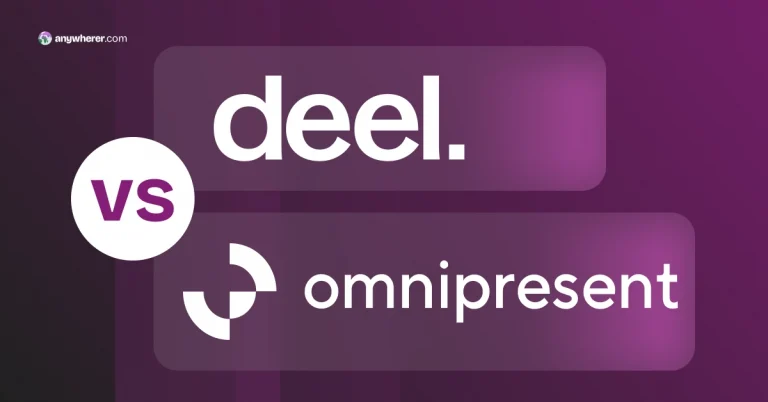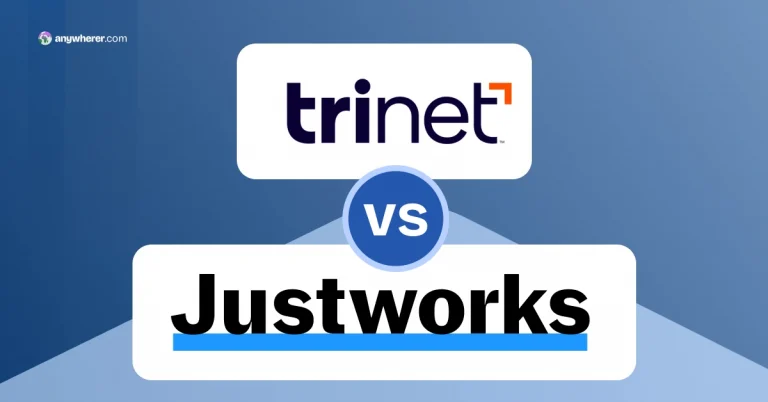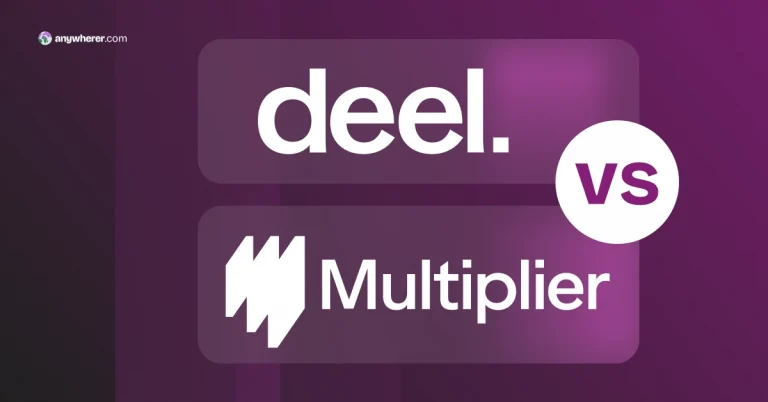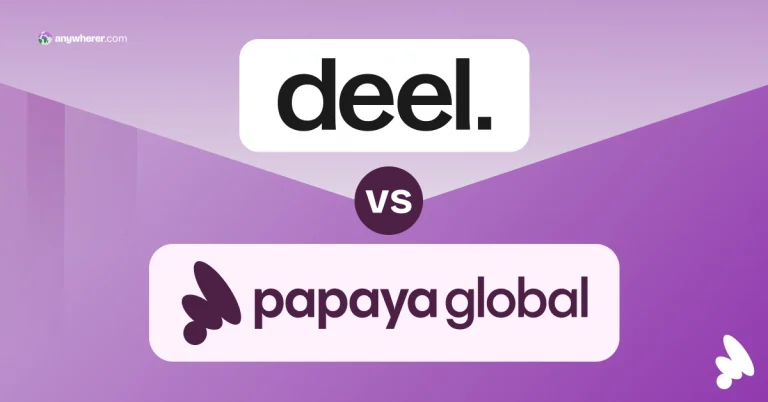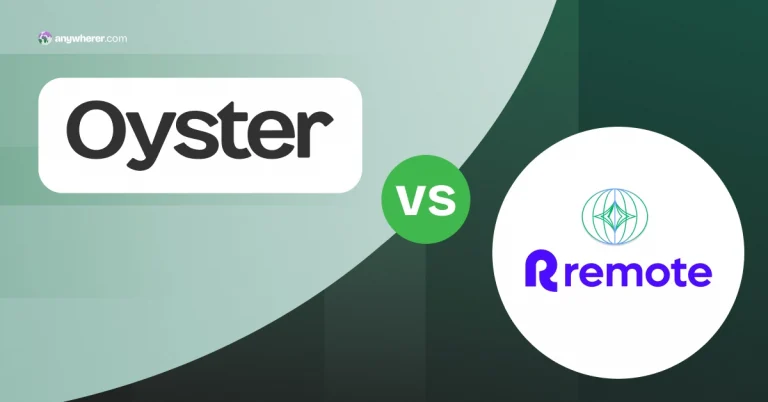Deel vs Oyster Compared
For companies seeking an EOR, there are numerous options to consider. While the market offers a diverse range of alternatives, if your choice is between Oyster and Deel, this article will give a detailed comparison of both.
As one of Oyster HR competitors, Deel stands out as an equally great tool for hiring globally, but they go about it in different ways. Depending on what your business needs, one might be a better fit than the other. So how do you figure that out?
We’ve made it easy with a simple side-by-side comparison. From compliance and pricing to integrations and support, we’ve broken down the key differences to help you decide what works best for you. Let’s jump in and see how they stack up.
Deel vs Oyster: Key Facts
These stats were accurate at the time of publication in March 2025.
See Detailed Deel and Oyster Reviews
The Defining Features of Deel vs Oyster
While both EOR platforms offer a sophisticated tool set for managing global teams, they have certain distinctions. Comparing Oyster and Deel across various features provides valuable insights into their capabilities.
Staying on top of compliance
Deel has a handy Compliance Hub that keeps an eye on changing regulations in 150+ countries. It’ll flag any potential issues or updates, so you’re always in the loop when it comes to international labor laws.
Oyster takes a slightly different approach. They’ve built a solid, compliant foundation in over 180 countries, backed by a team of legal pros who help you reduce the risks of global hiring.
Hiring globally vs. managing it all in one place
Deel’s sweet spot is helping you hire and stay compliant when building a global team. It’s streamlined for bringing on international talent without needing to plug deeply into your IT systems.
Oyster, on the other hand, is more of an all-in-one solution. You can hire, pay, and manage both employees and contractors around the world – all from one platform.
Integrations and automation
Deel offers over 110 integrations with various business tools, enhancing functionality and streamlining operations.
Oyster provides automated workflows and integrations, though with a more limited selection than Deel.
Customer support
Deel provides 24/7 multichannel in-house support, including in-app chat, email, WhatsApp, phone, and more.
Oyster offers customer support, though specific details about availability and channels are less prominently advertised.
Deel vs Oyster: Core Differences
Comparison Points
Starting price for contractor management*
Starting price per EOR*
Countries covered
Platform’s core approach
Customer support availability and channels
Free trial
Integrations
$49 per
user/month
Starting from
$599 per employee/month
150+ countries
Global compliance and contractor management
Live Chat, Webform, WhatsApp, Email
Yes
100+
Comparison Points
Starting price for contractor management*
Starting price per EOR*
Countries covered
Platform’s core approach
Customer support availability and channels
Free trial
Integrations

$29 per contractor/month
$599 per employee/month
180+ countries
Unified global employment
Live chat, email, ticketing system
Yes
15+
*We’ve listed prices as they were at the time of writing in March 2025, noting that they may be updated.
Deel vs Oyster: Use Cases and Benefits Breakdown
When evaluating EOR platforms, it’s essential to consider factors such as company size suitability, geographic presence, industry usage, and common use cases. Here’s how Oyster and Deel compare in these aspects:
How do the platforms compare in terms of company size suitability?
Both Deel and Oyster cater to businesses of various sizes, popular among small and mid-sized businesses. But Deel has a slightly broader scalability for enterprises, and Oyster – more used by mid-sized businesses.
- Small businesses (≤50 employees): 44% of Deel’s clients, 44% of Oyster’s clients.
- Mid-sized businesses (51-1000 employees): 42% of Deel’s clients, 49% of Oyster’s clients.
- Enterprises (>1000 employees): 10% of Deel’s clients, 6% of Oyster’s clients.
How are the platforms’ clients distributed across specific geographic regions?
Both Deel and Oyster have strong global coverage, but their focus areas differ. Deel operates in 150+ countries with a strong presence in developed markets, including North America, Europe, and Asia-Pacific. Deel’s compliance infrastructure makes it a preferred choice for multinational corporations expanding into various global markets.
Oyster covers 180+ countries, with a notable emphasis on emerging markets. Oyster is particularly well-suited for businesses hiring in underrepresented regions, providing a more inclusive approach to global hiring.
- North America: 11% of Deel’s clients, 20% of Oyster’s client base.
- Europe: 15% of Deel’s clients, 49% of Oyster’s client base.
- Latin America: 39% of Deel’s clients, 10.5% of Oyster’s client base.
- Asia: 26% of Deel’s clients, 13.5% of Oyster’s client base.
- Middle East & Africa: 6% of Deel’s clients, 5% of Oyster’s client base.
- Australia: 0.4% of Deel’s clients, 0.8% of Oyster’s client base.
Sources:
Which industries commonly use Deel and Oyster?
Deel serves a wide array of industries, including technology, finance, healthcare, and manufacturing. Its versatile platform is designed to meet the diverse needs of various sectors.
While also serving multiple industries, Oyster’s B Corp certification and mission-driven approach resonate strongly with nonprofits, social enterprises, and companies prioritizing ethical and sustainable practices.
- IT & Computer Software: 37% of Deel’s and 42% of Oyster’s client base.
- Financial & Legal Services: 6% of Deel’s and 3% of Oyster’s client base.
- Marketing, Advertising, Translations: 8% of Deel’s and 5% of Oyster’s client base.
- Consumer Services: 4% of Deel’s and 2% of Oyster’s client base.
- Human Resources, Staffing and Recruiting: 3% of Deel’s and 2.5% of Oyster’s client base.
- Accounting: 2% of Deel’s and 3% of Oyster’s client base.
Sources:
What are the typical ways that companies use Deel and Oyster?
While Oyster doesn’t provide as many case studies on the website as Deel, we can still gauge some information about the reasons companies use both platforms. A significant number of cases are dedicated to companies focused on global hiring and market expansion, making it clear that the providers are suitable for companies looking to leverage EOR services.
- Global hiring and market expansion: 89% of Deel’s case studies and 60% of Oyster’s cases.
- Payroll and HR operations: 50% of Deel’s case studies and 53% of Oyster’s cases.
- Visa support: 8% of Deel’s case studies and 13% of Oyster’s cases.
Oyster vs Deel: Through the Lens of 4Ps Methodology
Oyster and Deel have their strengths, catering to different business needs, from contractor payroll management to full-time employment compliance, and considerations that you may want to take into account. This section evaluates both platforms based on four key criteria: Performance, Presence, Pricing, and Platform Experience to determine which solution aligns best with different business requirements.
Deel vs Oyster Performance
Both Oyster and Deel provide comprehensive EOR solutions, but their core functionalities cater to different priorities.
Deel offers a strong focus on global expansion and payroll automation. With tools such as Global Salary Insights and Global Employment Comparison it helps businesses optimize international hiring strategies. The platform also provides automated invoicing, localized agreements, and seamless contractor payments. It operates via third-party legal entities in some regions to allow businesses to quickly onboard contractors without local entity setup.
Oyster is built for businesses hiring full-time employees internationally, with a compliance-first approach. It provides end-to-end HR management, including payroll, benefits, and compliance monitoring. The platform offers contractor-to-employee transition support, making it easier for businesses to scale teams into full-time roles.
Deel features:
- Employment comparison tool to analyze employment types in specific regions.
- Deel card to support multiple withdrawal methods.
- Deel Advance to provide contractors with short-term cash advances.
Oyster features:
- Contractor vs. full-time employee analyzer for assessing misclassification risks.
- Employment terms to compare key aspects across various countries.
- Equity assessment to find out how to provide equity to global employees compliantly.
Oyster vs Deel Presence
Oyster covers significantly more countries than Deel, 180 and 150 respectively. As an Oyster HR competitor, Deel provides strong payroll and tax compliance support in multiple jurisdictions. Oyster has fully owned legal entities in key markets, ensuring direct compliance oversight.
Deel’s coverage is supported by:
- Strong payroll in multiple jurisdictions, boosted with Global Salary Insights and Global Employment Comparison tools.
- Tax compliance support across the 150+ countries it covers.
- Comprehensive benefits offerings that align with local requirements.
Oyster’s global presence is reflected in:
- Fully owned legal entities in key markets, ensuring direct compliance oversight.
- Strong presence in the IT & Software industry, where 42% of users are from this sector.
- Local compliance in every covered region.
Oyster HR vs Deel Pricing
Both Deel and Oyster offer competitive flat-rate pricing, but the details can vary depending on your hiring setup.
With the Oyster alternative Deel, you’ll pay $49/month per contractor, which covers things like automated invoicing, local contracts, and compliance help. If you’re using Deel’s Employer of Record service to hire full-time employees, the cost is $599/month per employee – that includes payroll, benefits, and compliance. Deel also offers custom enterprise solutions, but keep in mind there could be extra costs for things like currency conversion, tax complexities, or special integrations, which can make the final price a bit unpredictable.
Oyster’s pricing is in the same ballpark. EOR services also start at $599/month per employee, with coverage for payroll, benefits, and compliance. Contractor pricing is custom and varies based on things like location and volume. Where Oyster stands out is in the perks – they offer discounts for high-volume hiring and even provide free EOR services for up to 10 refugee employees, which is a big plus if social impact is important to your company.
Heads up: These prices are current as of March 2025, but they might change down the road.
Deel pricing
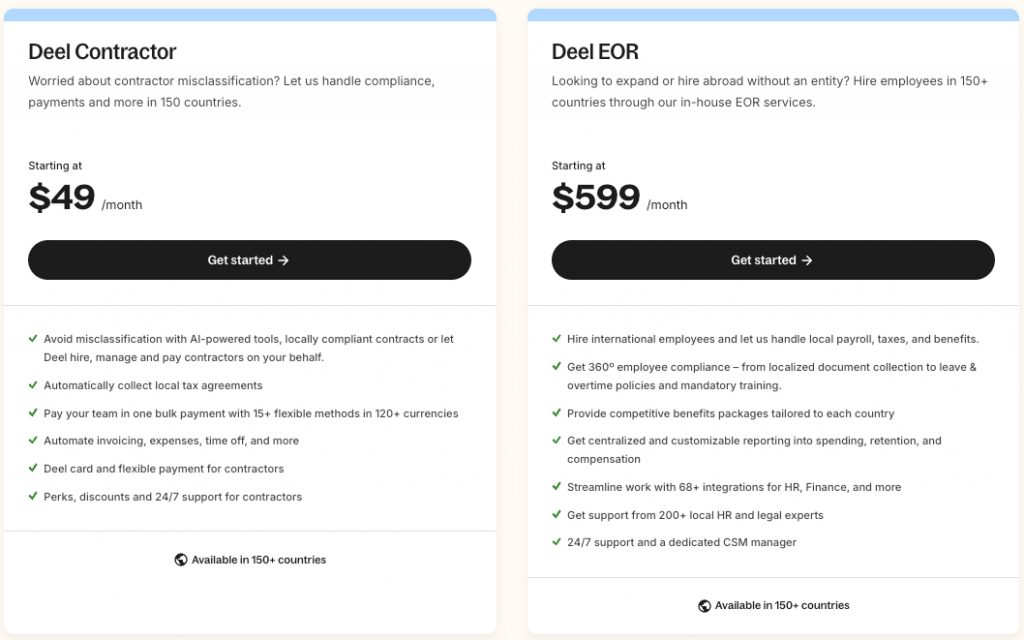
Oyster pricing
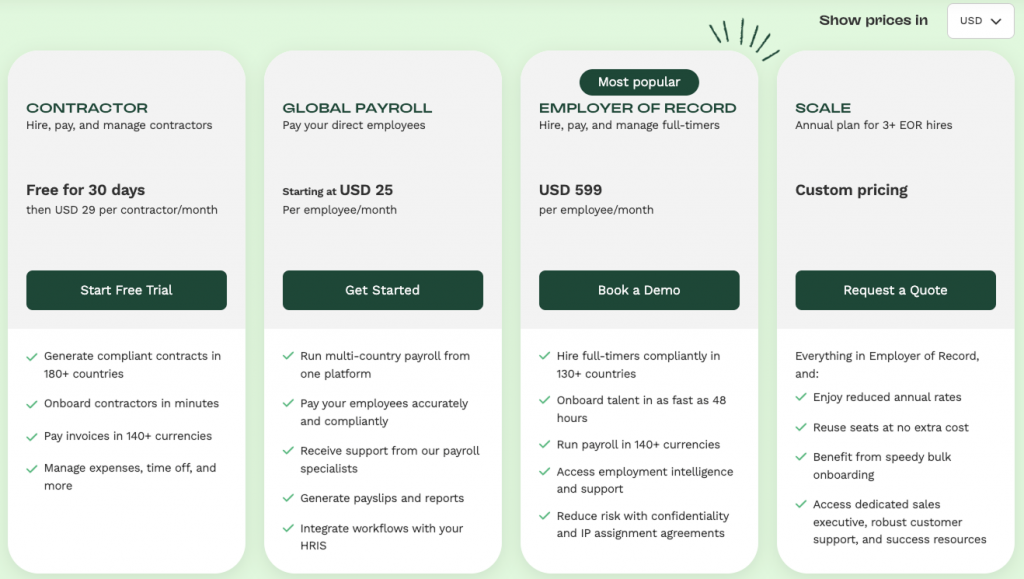
Deel vs Oyster Platform Experience
As one of the alternatives to Oyster HR, Deel makes cross-border hiring feel easy. The platform’s clean, intuitive interface and automated workflows help you bring on global talent without getting bogged down in admin. It also connects seamlessly with tons of third-party tools, so it fits right into your existing setup. Onboarding is smooth too – with clear, step-by-step tutorials to guide you through managing both employees and contractors. One of Deel’s standout strengths is compliance automation – it takes care of the legal stuff behind the scenes. And if you need help? Their support team is quick to respond and offers localized assistance to handle region-specific questions.
Oyster takes more of an all-in-one HR approach. It gives your global hires a self-service portal, so they can onboard themselves with ease, no hand-holding required. Oyster also shines when it comes to workforce visibility. Its built-in analytics let you track payroll, compliance, and benefits in one place, making it easy to spot trends and stay on top of everything. The interface is clean and centralized, which makes managing a global team feel less overwhelming. Plus, tools like the Employee Cost Calculator come in handy when you’re planning to expand into new countries.
Deel’s experience is reflected through:
- Self-service contractor management portal with intuitive payroll automation.
- Step-by-step onboarding guides for seamless hiring.
- Seamless integration with third-party HR tools.
- Strong customer support with localized assistance in multiple regions.
Oyster’s experience is facilitated by:
- User-friendly interface focused on centralized workforce management.
- Employee self-service portal for efficient onboarding and payroll management.
- Comprehensive analytics and workforce insights to support hiring decisions.
Curious how Oyster stands against other competitors? Check out this in-depth Remote vs Oyster comparison to see how they compare across features, customer support and international expansion capabilities.
Evaluating the Strengths & Weaknesses of Deel vs Oyster
Deel and Oyster offer great tools for managing remote teams globally, with Deel excelling in ease of use and Oyster standing out for its automation and transparent pricing. However, based on user reviews, the platforms have areas for improvement, especially in terms of customization, customer support, and handling complex tax scenarios.
Deel vs Oyster: User Reviews and Ratings

The ratings from the platforms mentioned above are based on data available as of March 2025. Please note that these ratings may change over time as more reviews are submitted.
Deel and Oyster Strong Points
Deel gets a lot of likes for its user-friendly platform. Customers often mention how easy it is to use and how much smoother it makes the whole global hiring process. One of its biggest pluses? Handling international payments with zero hassle. For companies that want to scale quickly without setting up local entities, Deel is a popular go-to.
Oyster, meanwhile, wins points for being a true all-in-one solution. Users really like how much admin work it takes off their plate – onboarding, payroll, and more are largely automated. Its transparent pricing is another big hit – people appreciate knowing exactly what they’re paying for, with no surprise fees along the way.
Deel and Oyster:
Strengths Based on User Reviews
Detail-oriented support
Easy to use interface
Simplified HR processes
Convenient international payments
Extensive feature set
Automated features

User-friendly interface
Proactive and responsive support
Simplifies complex processes
Personalized approach
Straightforward onboarding
Simple employee interface
User Considerations for Deel and Oyster
While Deel, an Oyster HR competitor, is praised for its ease of use and ability to streamline global payroll, users mention concerns about its pricing and the limitations in customizing benefits for employees in specific regions. Some also report that customer support can be slow to respond to more complicated queries, which may impact the overall user experience.
Oyster’s users have pointed out that navigating complex tax scenarios can be tricky, especially in certain regions. Some users also note that the platform can rely on third-party vendors for specific countries, which can sometimes complicate the experience. Additionally, while the platform is feature-rich, some users feel there is a learning curve to fully mastering its capabilities.
Deel and Oyster:
Considerations Based on User Reviews
Withdrawal methods vary with country
Complex workflows
Steep learning curve
Expensive features
Generic support responses

Unclear payment structure
Limited contract customizations
Inconsistencies in support quality across different countries
Limitations for HRIS integration
Lack of bulk download for documents
Oyster HR vs Deel Core Functionality Comparison
Deel Payroll Managment
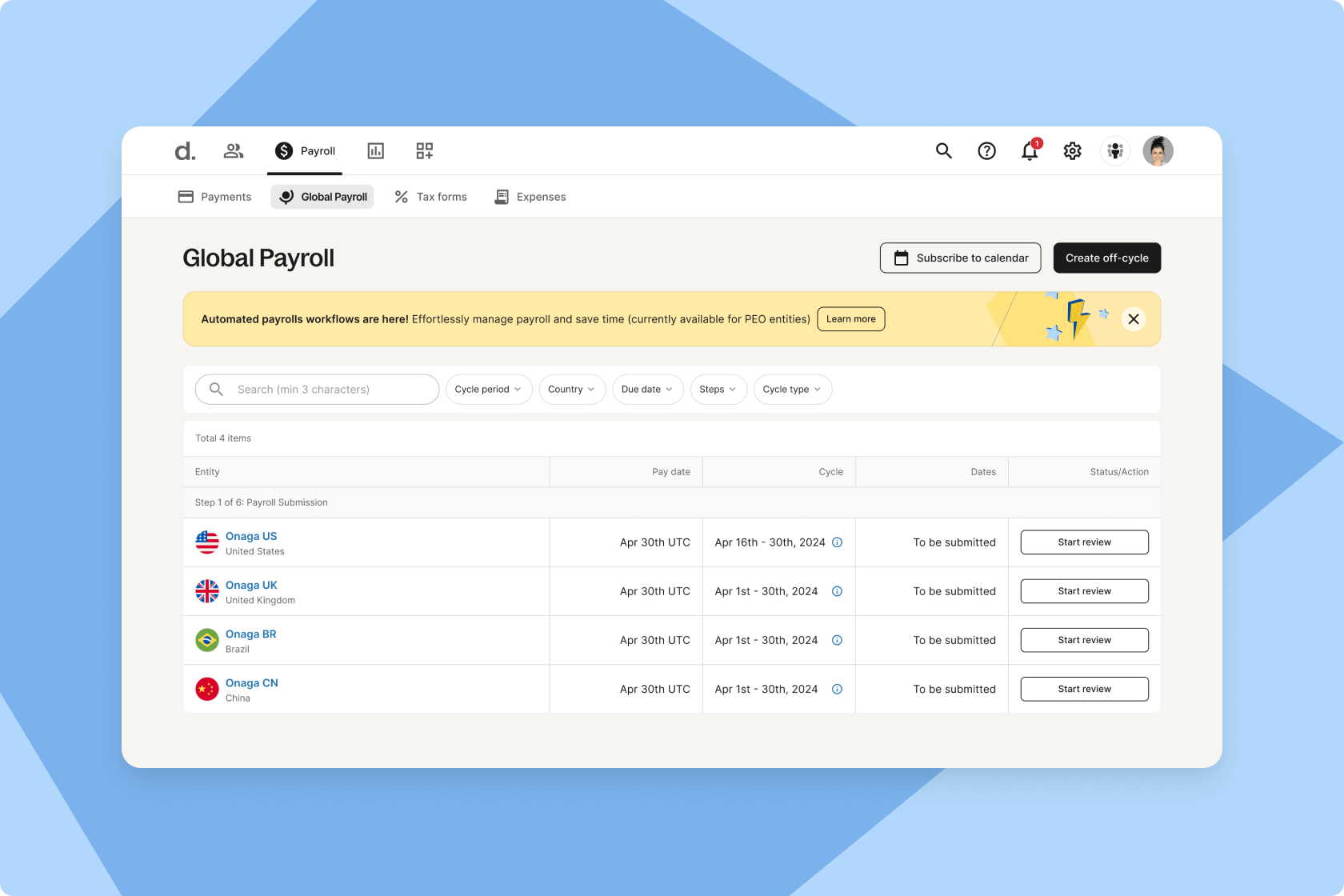
Deel handles global payroll by processing payments to employees and contractors. The platform supports local bank transfers and ensures all payroll processes legally comply with local regulations.
Capabilities:
- Supports payments in over 100 currencies.
- Full compliance with local tax regulations for both employees and contractors.
- Multiple payout options, including bank transfers, PayPal, and others.
- Automated payroll runs and direct deposits.
- Centralized payroll dashboard for tracking and reporting.
Oyster Payroll Management
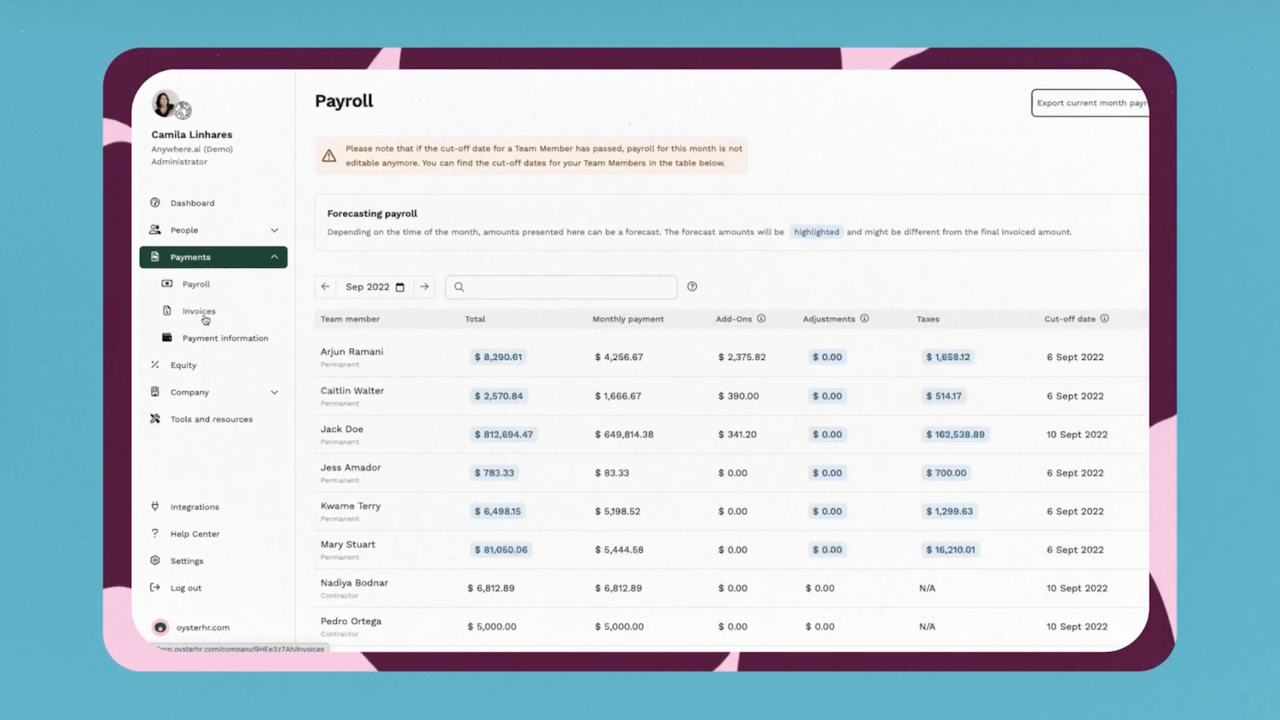
Oyster’s global payroll system simplifies payroll management for both employees and contractors. The platform automates payroll processes, ensuring businesses can pay their teams on time and in the correct currency.
Capabilities:
- Handles payroll in over 180 countries, ensuring legal compliance.
- Multi-currency payments with seamless conversions.
- Payroll automation for recurring payments, taxes, and deductions.
- Local bank transfers and other flexible payout methods.
- Reports and analytics for payroll management.
Deel Contractor Management
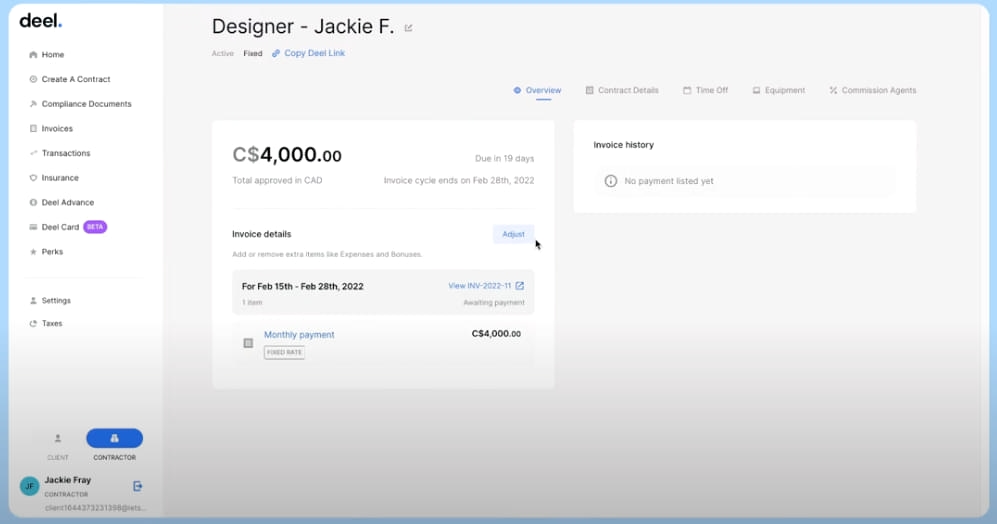
Deel allows businesses to onboard, manage, and pay contractors in over 150 countries, with a focus on simplifying compliance with local regulations. It provides a platform where businesses can generate contracts, collect necessary tax information, and ensure timely payments.
Capabilities:
- Global contractor onboarding with digital contracts.
- Seamless payment processing in multiple currencies.
- Automatic contract generation with compliance to local laws.
- Centralized dashboard to manage all contractor details.
- Tax document generation (e.g., W-9, W-8BEN for U.S. contractors).
Oyster Contractor Management
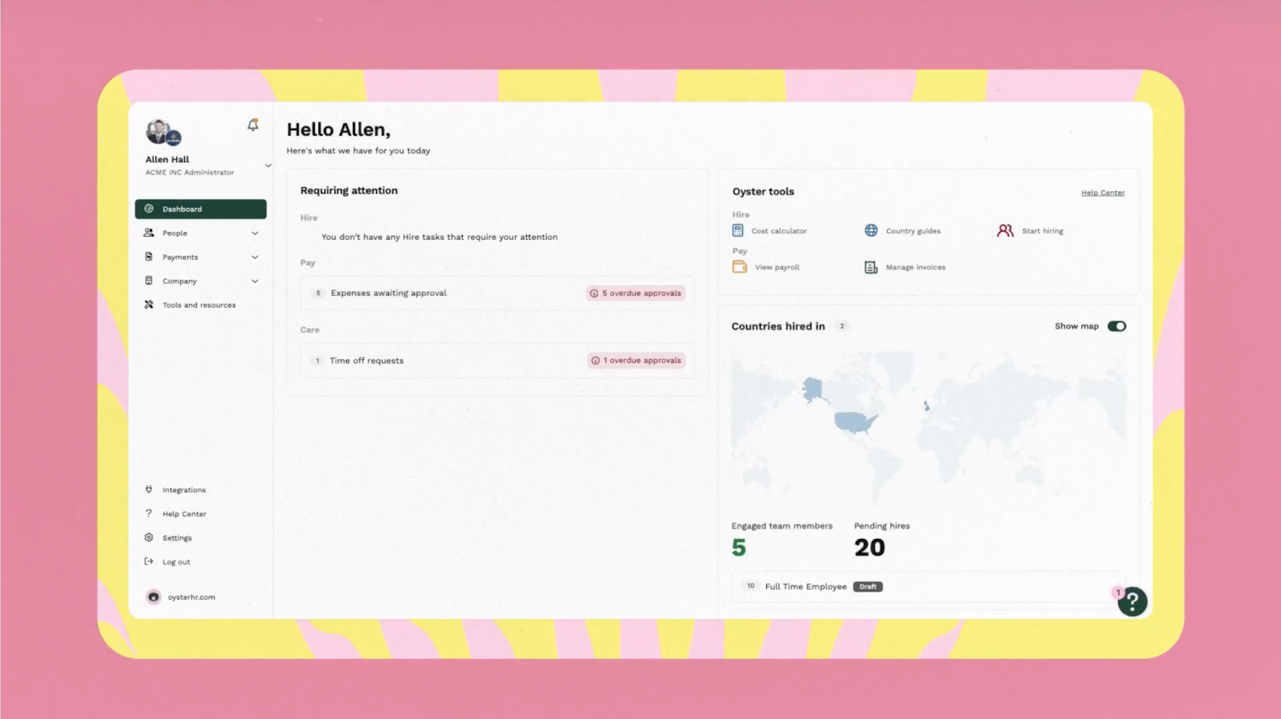
Oyster provides an intuitive platform for managing global contractors, focusing on global payroll compliance and efficient contractor management. The platform simplifies the process of hiring contractors from different regions, managing their contracts, and paying them in local currencies.
Capabilities:
- Automatic contract creation with region-specific legal compliance.
- Customizable contracts for different types of engagements.
- Contractor management dashboard for real-time visibility.
- Automated tax form generation, including region-specific requirements.
Deel Integrations
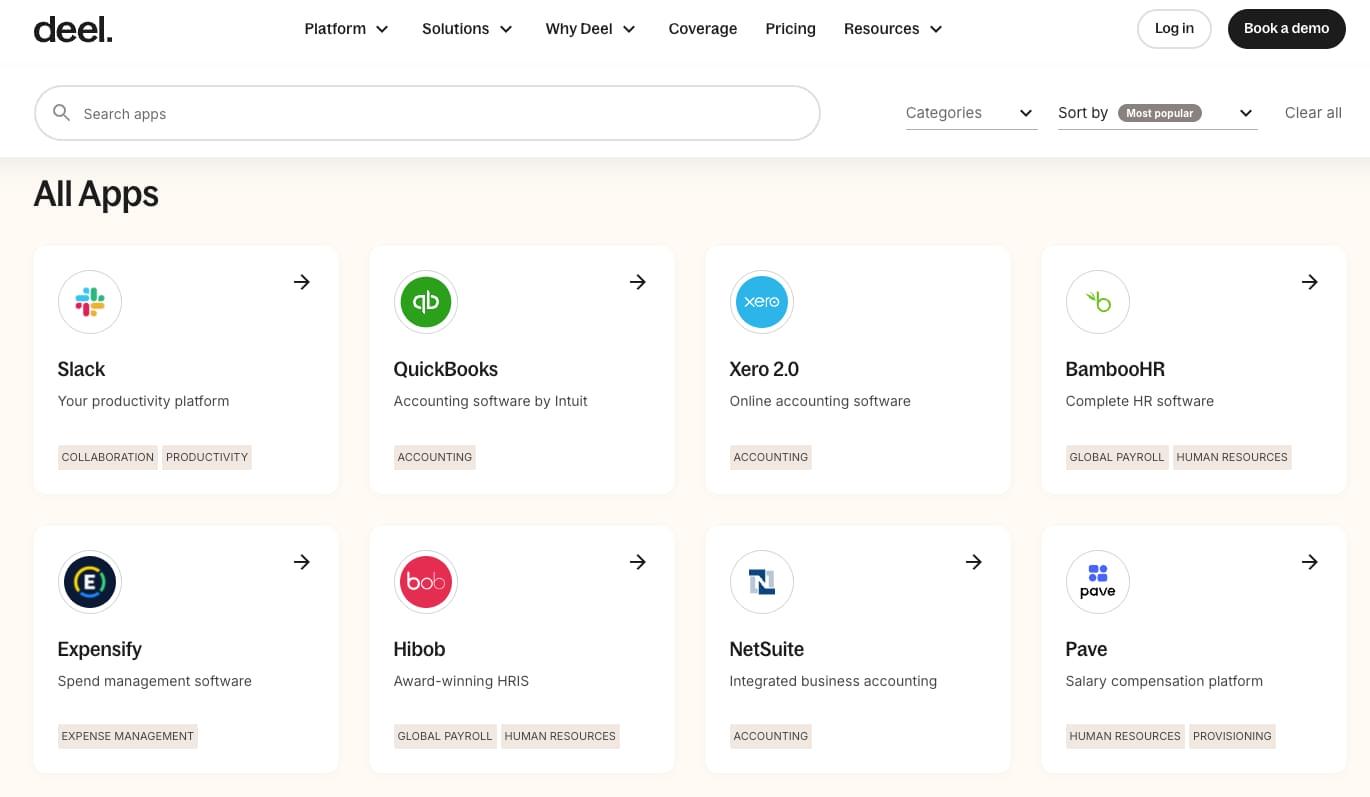
Deel integrates with a wide range of third-party platforms to streamline business operations, including HR software, accounting tools, and more. These integrations help businesses maintain smooth workflows and automate various processes.
Capabilities:
- Integrates with popular tools like BambooHR.
- Syncs with accounting platforms like QuickBooks and Xero.
- Integrates with payment processors such as PayPal, Wise, and more.
- Seamless API integrations for custom workflows.
- Pre-built integrations with productivity tools like Slack and Google Workspace.
Oyster Integrations
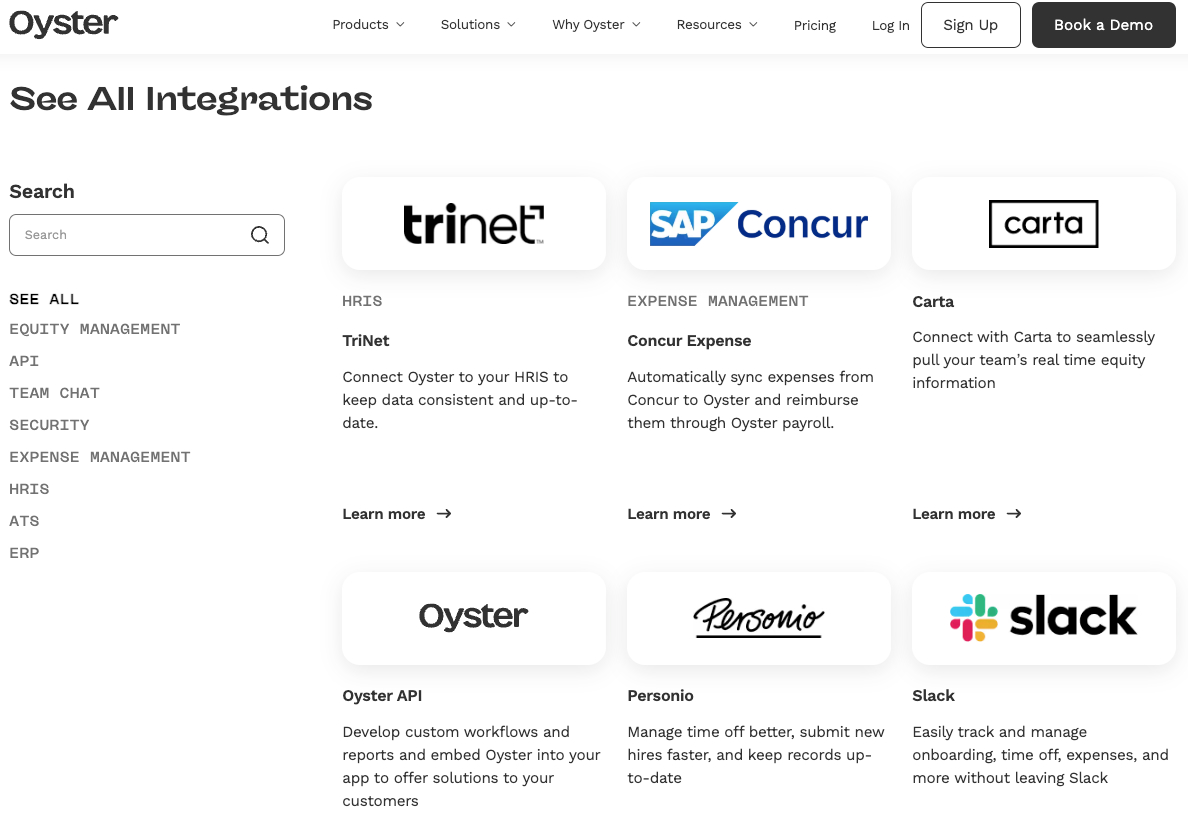
Oyster offers a variety of integrations to help businesses connect their existing tools with the platform, allowing for a seamless experience across different departments.
Capabilities:
- Integrates with payroll, HR, and benefits platforms.
- Accounting integrations with tools like Xero and QuickBooks.
- Employee management integrations with Slack and Google Workspace.
- Customizable API for tailored integrations with other business systems.
- Easy integration with time tracking and performance management tools.
Final Thoughts: Deel vs. Oyster
Both Deel and Oyster are solid picks for managing global teams, each bringing something unique to the table when it comes to payroll, compliance, and contractor management.
Deel really stands out for its global reach and super intuitive platform. It’s built for speed and simplicity, making it a great option if you want to onboard, pay, and stay compliant across multiple regions without a ton of friction. It’s especially strong if you’re okay with investing a bit more for access to a wide range of features and integrations.
Oyster, on the other hand, puts transparency and automation front and center. With coverage in 180+ countries and a pricing model that’s easy to understand, it’s a great fit for businesses that value clarity, efficiency, and smart automation. Oyster also does a great job with region-specific perks and navigating tricky tax situations.
FAQ About Oyster vs Deel Distinctions
What are the key differences between Oyster and Deel?
Oyster HR alternative Deel provides broader payment options, supporting over 120 currencies, including cryptocurrency, and features built-in HRIS and Earned Wage Access. Oyster, on the other hand, is more focused on compliance support, employee benefits customization offering cost-effective contractor management.
What are the pricing models for Oyster and Deel?
Oyster offers contractor management starting at $29 per contractor per month and full-time employee services at custom pricing. Deel has a tiered pricing structure depending on the type of contract (contractor vs. full-time employee) and additional HR services.
Are there any hidden fees with Oyster or Deel?
Both platforms maintain transparency, but Deel may include additional charges for specific payment methods (e.g., cryptocurrency transactions) and certain HR add-ons. Oyster has a straightforward pricing structure, but may have extra costs for premium compliance services.
How do the onboarding processes differ between Oyster and Deel?
Deel makes onboarding super quick and mostly hands-off. The whole process is automated, from generating contracts to running compliance checks, so you can get new hires up and running fast without a lot of back-and-forth.
Oyster, meanwhile, takes a more hands-on, compliance-first approach. It’s not quite as fast as Deel’s flow, but it puts extra care into making sure every hire is fully aligned with local labor laws. So while it might take a little longer, you get that extra peace of mind.
How does customer support compare between Oyster and Deel?
Deel offers 24/7 support, which is a big win if you’re working across time zones. You can reach them through chat, email, phone, and even Slack if you’re an enterprise customer.
Oyster’s support is more traditional: they provide a dedicated support team and a detailed Help Center, but they might not be available around the clock. That said, their focus is more on personalized help than instant replies.
Explore both options through this guide, demo trials, and consultations to make a balanced decision.

Yaryna is our lead writer with over 8 years of experience in crafting clear, compelling, and insightful content. Specializing in global employment and EOR solutions, she simplifies complex concepts to help businesses expand their remote teams with confidence. With a strong background working alongside diverse product and software teams, Yaryna brings a tech-savvy perspective to her writing, delivering both in-depth analysis and valuable insights.





